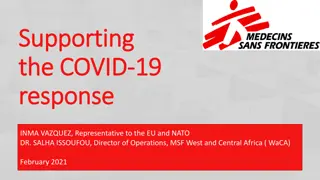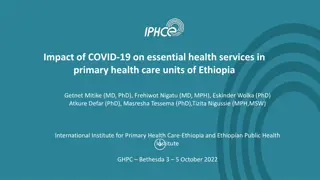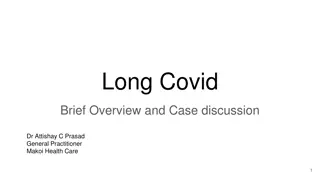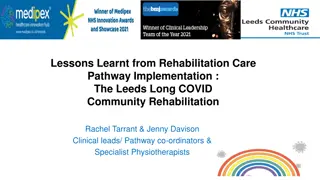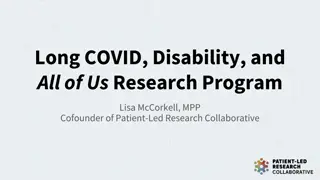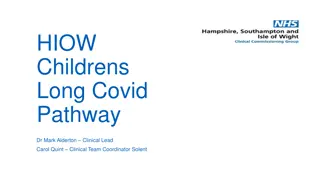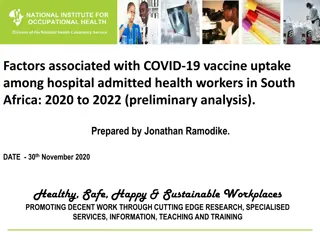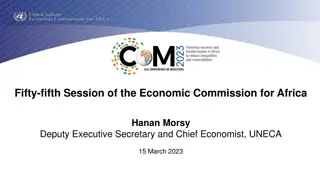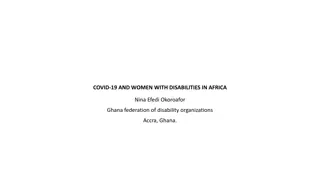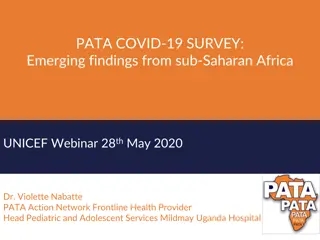Impact of COVID-19 on Access to Health Services in Africa
Over a year into the pandemic, the Partnership for Evidence-Based Response to COVID-19 (PERC) highlights the significant impact of COVID-19 on access to health services and medication in Africa. Fear of contracting the virus remains a major reason for missed care, affecting both preventive and life-threatening services. Cost of care continues to be a barrier, particularly for those facing economic challenges due to the pandemic. Urgent actions are needed to address gaps in service delivery and protect healthcare workers while ensuring safe access to care.
Download Presentation

Please find below an Image/Link to download the presentation.
The content on the website is provided AS IS for your information and personal use only. It may not be sold, licensed, or shared on other websites without obtaining consent from the author. Download presentation by click this link. If you encounter any issues during the download, it is possible that the publisher has removed the file from their server.
E N D
Presentation Transcript
Partnership for Evidence-Based Response to COVID-19 Access to health services during the pandemic Key findings from a February 2021 survey from the Partnership for Evidence-Based Response to COVID-19 (PERC) 1 1 August, 2020
Table of contents About this presentation Key findings and recommendations In-depth findings Access Barriers Services
About this presentation PERC released findings from its February 2021 survey in which people from 19 African Union (AU) Member States were asked about their perceptions of public health and social measures (PHSMs), vaccines, food, income and health services during COVID-19. Further details on the survey may be found at www.preventepidemics.org/perc. This presentation focuses specifically on how COVID-19 has affected access to health services since the start of the pandemic, as well as between PERC s August 2020 and February 2021 surveys. Respondents were asked about their personal access to health services and medication, as well others in their household. They were also asked about which types of services they skipped and their reasons for doing so. The findings from February 2021 are compared to findings from PERC s August 2020 to understand how access has changed overtime. 19 AU Member States surveyed by PERC
Key findings: February 2021 PERC survey More than a year into the pandemic, COVID-19 continues to have severe affects on access to health services and medication in Africa. Fear of contracting COVID-19 at health facilities, or simply by leaving home, is still the most common reason reported for missed care. People are not just missing preventive care visits, they are continuing to miss services for life threatening conditions and diseases. Cost of care remains a major barrier to access, with those most affected by the economic downturn brought on by the pandemic at greatest risk.
Call to Action Addressing gaps in service delivery and demand for care is not only critical for detecting, treating and slowing transmission of COVID-19, but also for addressing concurrent health crises. As immediate next steps, Member States must prioritize: Vaccinating health care workers and strategically communicating to the public that seeking care at health facilities is safe. Provide other protections for health care workers, including adequate PPE, as well as fair compensation, paid sick leave and access to mental health care. Continue using an evidence-based approach to identify and offer relief to high- risk populations to limit the affects of the pandemic on their health and nutrition.
Access to health services and medication
How has the pandemic affected health care access in Africa? Of respondents that said they or someone else in their household needed health care, more than 40% have reported skipping or delaying services since the start of the pandemic. 100% 100% 80% 80% Needed health care 41% Missed health care 64% 60% 60% 40% 40% 57% Did not miss health care Did not need health care 20% 35% 20% 0% 0%
How has the pandemic affected health care access in Africa? Question: When was the last time you or any other person in your household missed or delayed care (as February 2021)? 60% 55% 50% 40% 30% 20% 20% 11% 8% 10% 4% 0% Longer than 12 months ago Over 9 months ago, but within last 12 months Over 6 months ago, but within last 9 months Over 3 months ago, but within the last 6 months In the last 3 months
How has the pandemic affected health care access in Africa? Percent of respondents that said they or someone else in their household in need of care skipped services August 2020 survey compared to February 2021 survey 100% 75% 50% x x 25% 0 Start of pandemic to August 2020 September 2020 to February 2021
How did health care disruption differ by Member State? Percent of respondents reporting that they or someone in their household in need of health care had skipped services in the previous six months 100% 82% 75% 71% 61% 54% 53% 50% 49% 50% 47% 43% 41% 44% 43% 42% 41% 42% 40% 41% 37% 37% 38% 37% 37% 37% 32% 30% 29% 28% 28% 28% 26% 24% 23% 22% 22% 25% 20% 19% 18% 12% 11% 0% Aug-20 Feb-21
How did health care disruption differ by respondent characteristics? Reports of missed care were notably high among people that lost some or all of their income during COVID-19 compared to those that had not lost any of their income. Missed or delayed care was also slightly higher among urban households compared to rural, aligning with higher COVID-19 reported cases rate in cities. This was also the case in August 2020. Percentage of households in need of health care that missed services in the previous six months, by income and location 50% 50% 42% 40% 35% 40% 33% 29% 30% 30% 20% 20% 20% 10% 10% 0% 0% No income loss Urban Rural Lost some income Lost all income
How did health care disruption differ by respondent characteristics? As was the case in August 2020, reports of individual-level missed visits* among those in need of care were highest among people with longstanding health issues and those ages 46 and older. This indicates that issues accessing care were more pronounced among those that likely needed it most. Women were also more likely to report missed care than men, though only slightly. Percent of individual respondents in need of health care that missed health services in the previous six months, by health status, gender and age 60% 53% 50% 42% 37% 40% 35% 34% 31% 30% 20% 10% 0% No chronic health problems Female Male Chronic health problems Ages 18-45 Ages 46+
How has the pandemic affected access to medication? Of respondents that said they or someone else in their household needed medication, more than 43% reported that they had experienced some difficulty accessing it in the previous three months. Among them, 43% said they experienced difficulty accessing their medication in the previous three months* About nine in ten respondents reported that they or someone in their household had needed medication 100% 100% Much more difficult (N=4,003) 20% 80% 80% A bit more difficult (N=4,603) 23% Household needed medication (N=20,014) 60% 60% 89% 40% 40% Did not have difficulty (N=11,251) 55% 20% 20% Household did not need medication (N=2,458) 11% 0% 0% *rebased, 2% reported they did not know
How has the pandemic affected access to medication? Percentage of households in need of medication that reported difficulty accessing it in the previous 3 months* August 2020 survey compared to February 2021 survey 50% 40% 30% 48% 43% 20% 10% 0% August 2020 February 2021 *Excluding Morocco, which wasn t surveyed in August
How has the pandemic affected access to medication? Percentage of households in need of medication that reported difficulty accessing it in the previous 3 months 100% 80% 75% 71% 65% 59% 56% 53% 56% 50% 53% 51% 48% 36% 46% 43% 48% 50% 37% 42% 45% 35% 39% 32% 37% 29% 34% 31% 33% 36% 31% 31% 30% 28% 28% 26% 26% 28% 25% 21% 21% 0% Aug-20 Feb-21
How has the pandemic affected access to medication? Issues accessing medication were highest among the lowest income respondents, as well as those that lost some or all of their income during the pandemic. Percentage of households in need of medication that reported it was much more or a bit more difficult to access it in previous three months 60% 60% 47% 51% 50% 47% 50% 38% 40% 40% 30% 27% 30% 20% 20% 10% 10% 0% 0% Lost all income Lost some income No income loss Lowest income quartile Highest income quartile
How are misconceptions affecting health care access? Widespread belief that health care workers will give you COVID-19 can lead to stigmatization of health care workers in their communities and further prevent people from seeking care. Health care workers should be avoided because you might catch COVID-19 from them 51% 48% 0% 25% 50% 75% 100% Definitely/probably true Definitely/probably false
What were the reasons people reported for missing care? Reasons respondents said they or someone else in their household missed or delayed care* in the past six months 26% Worried about catching COVID-19 22% Health facilities were too busy or closed 20% Cost/affordability 13% Did not have time in general 10% Health facility too far, no one to take me 8% Couldn't get to facility due to lockdown 6% Health issue was not urgent 6% Could not go because of childcare/caring for sick family member Self-isolating with suspected COVID-19 2% 0% 5% 10% 15% 20% 25% 30% *respondents could select multiple reasons
What were the reasons people reported for missing care? Fear of catching COVID-19 Percent of respondents attributing missed care to worry about catching COVID-19 All respondents 26% Tunisia 56% Egypt 56% Morocco 40% Cameroon 34% Ghana 32% Senegal 29% Zambia 29% Cote d`Ivoire 27% Kenya 21% Ethiopia 21% South Africa 19% Guinea 17% DRC 15% Sudan 14% Zimbabwe 11% Uganda 11% Nigeria 10% Mozambique 10% Liberia 6% 0% 10% 20% 30% 40% 50% 60%
What were the reasons people reported for missing care? Fear of catching COVID-19 was also slightly higher among female respondents compared to male, as well as those living in urban areas compared to rural. Percent of respondents attributing missed care to worry about catching COVID-19 40% 30% 29% 30% 23% 23% 20% 10% 0% Rural Urban Male Female
What were the reasons people reported for missing care? Health facility disruptions Percent of respondents attributing missed care to health facility disruption/issues All respondents 22% Mozambique 42% Kenya 41% Sudan 36% South Africa 33% Zimbabwe 31% Ghana 25% Ethiopia 22% Tunisia 21% Zambia 20% Morocco 19% Nigeria 18% Senegal 17% Egypt 17% Uganda 17% Cameroon 15% Guinea 13% Cote d`Ivoire 11% Liberia 9% DRC 9% 0% 5% 10% 15% 20% 25% 30% 35% 40% 45%
What were the reasons people reported for missing care? Cost/affordability Percent of respondents attributing missed care to cost/affordability of health care All respondents 20% Cameroon 36% Cote d`Ivoire 30% Uganda 30% Morocco 29% Kenya 28% Liberia 25% Nigeria 24% Guinea 21% Tunisia 18% Sudan 18% DRC 18% Senegal 15% South Africa 15% Zimbabwe 13% Ghana 10% Zambia 8% Mozambique 8% Egypt 8% Ethiopia 4% 0% 5% 10% 15% 20% 25% 30% 35% 40%
What were the reasons people reported for missing care? Affordability as a barrier to care was more common among those that had lost all their income during the pandemic than those who had not highlighting how economic issues directly a result of the pandemic are exacerbating health access. Percent of respondents attributing missed care to cost/affordability issues, by loss of income during the pandemic 40% 30% 30% 18% 20% 13% 10% 0% Lost all income Lost some income No income loss
What were the most common types of health services missed? Types of health services missed among those that reported skipping care (N=4,442)* General/routine check-up 33% Diagnostic services/symptoms (e.g. fever; cough; body aches) 26% Non-communicable diseases (e.g. heart issues; diabetes) 23% Reproductive, maternal, newborn, child health 17% Communicable diseases (e.g. malaria, TB. HIV) 16% Vaccinations 3% Suspected COVID-19 2% 0% 5% 10% 15% 20% 25% 30% 35% *5% refused or reported they did not know which types of health services were missed; respondents could select multiple options
What were the most common types of health services missed? Types of health services missed among those that reported skipping care (N=4,442)* 34% General/routine check up 14% Malaria 10% Fever/chills 10% Cardiovascular issues 9% Diabetes 6% Fatigue/body pain 6% Respiratory problems 6% Care for children under age 5 5% Diarrhea/stomach pains 5% Antenatal care 4% Problems with pregnancy 3% Broken bones/sprains 3% Sinus issues 3% Vaccinations 3% Family planning 2% Suspected COVID-19 2% Cancer treatment 1% HIV treatment 1% Tuberculosis 1% Neurological disorders 1% Mental health issues 0% 5% 10% 15% 20% 25% 30% 35% *5% refused or reported they did not know which types of health services were missed; respondents could select multiple options
What were the most common types of health services missed? Fever/chills Percent of respondents reporting missing or delaying a health visit for fever or chills All respondents 10% DRC 30% Nigeria 25% Senegal 19% Ghana 14% Liberia 13% Kenya 13% Cote d`Ivoire 11% Uganda 11% Zambia 10% South Africa 10% Mozambique 10% Cameroon 10% Guinea 9% Sudan 9% Morocco 6% Zimbabwe 2% Egypt 2% Tunisia 1% Ethiopia 1% 0% 5% 10% 15% 20% 25% 30% 35%
What were the most common types of health services missed? Malaria Percent of respondents reporting missing or delaying a health visit for malaria All respondents 14% Uganda 40% Cote d`Ivoire 29% Kenya 23% Nigeria 22% Sudan 22% Cameroon 22% Zambia 20% DRC 20% Liberia 17% Ghana 15% Mozambique 13% Guinea Conakry 12% South Africa 2% Ethiopia 2% Senegal 1% Zimbabwe 1% Tunisia 0% Morocco 0% Egypt 0% 0% 5% 10% 15% 20% 25% 30% 35% 40% 45%
What were the most common types of health services missed? Women s health Percent of respondents reporting missing or delaying a health visit for family planning, antenatal care, and/or problems with pregnancy All respondents 12% Ghana 31% South Africa 25% Zimbabwe 24% Ethiopia 21% Uganda 17% Mozambique 16% Liberia 14% Cote d`Ivoire 14% Senegal 13% DRC 12% Nigeria 11% Guinea Conakry 10% Egypt 10% Kenya 9% Cameroon 9% Morocco 8% Sudan 8% Tunisia 6% Zambia 5% 0% 5% 10% 15% 20% 25% 30% 35%











